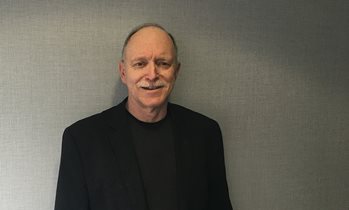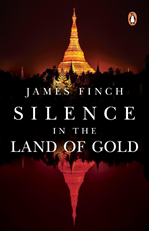Author Chats
James Finch Takes Readers From Burma’s Boardrooms to the Bush
April 05, 2022
In Duly Noted the D.C. Bar continues its author Q&A series featuring members who have published works in a variety of genres.
James Finch’s novel, Silence in the Land of Gold, introduces readers to a Burma whose history of ethnic and political conflict renders it a minefield for outsiders. Finch’s tale employs a shifting perspective, following foreign attorneys Molly Durberville and George Wilford as they investigate a plane crash and its connection to local struggles between the Burmese military and the Kachin Independence Army. As personal and political histories unravel, the reader is taken on a whirlwind tour of international business, local conflict, and the intersection of the two.
political conflict renders it a minefield for outsiders. Finch’s tale employs a shifting perspective, following foreign attorneys Molly Durberville and George Wilford as they investigate a plane crash and its connection to local struggles between the Burmese military and the Kachin Independence Army. As personal and political histories unravel, the reader is taken on a whirlwind tour of international business, local conflict, and the intersection of the two.
How would you describe your novel? It has the mystery, action, and romance of a spy novel, but there are also many social observations.
I would describe the novel as a mystery thriller, but what I’ve tried to do is cover a few things that I think are of importance and interest to lawyers and the general public. One thing is to describe what international transactional lawyers do in faraway places. Companies that are foreign investors come to a lawyer of a firm in a country like Burma, and first they want to negotiate a deal. Attorneys end up negotiating a deal with the other side — normally it’s the government, but it could be a local party.
Usually those foreign investors, particularly those conducting business in faraway places where legal systems are not very well developed, have particular interests. These interests involve issues that are not heavily regulated in the country, like labor rights or environmental protection. They want these things included in the deal to protect themselves. In the United States these are typically covered by legislation, but they aren’t covered in places like Burma. Or where there are local laws, they may be weakly enforced.
I also wanted to describe local lawyers working within that context. They’re the next link in what gets done. In particular, I wanted to cover female lawyers because in Burma there is a long tradition of female doctors and lawyers. I wanted to highlight what they do and the challenges and dilemmas they face.
A third group would be government players. In my book, the military is very much a part of the story. There are various good and bad characters, some more nuanced than others. I wanted to cover those characters because they are [seldom portrayed].
I’m also a fan of Orwell, and he spent much of his career in Burma. It has always been rumored that the characters in Animal Farm were based upon military figures in Burma. I don’t know if that’s true or not, but Orwell did write a wonderful book about Burma called Burmese Days and part of it is about the colonial experience. Much of what he described remains relevant today.
Burma is more than an exotic backdrop in your novel. How do you approach writing about the country and its people?
Silence in the Land of Gold is my fourth novel. In Silence and my three previous novels, I have portrayed various aspects of Burma’s culture that I think are unique because of its isolation from the rest of the world. I have, of course, gotten my material from the vast number of Burmese I have known — clients, lawyers, government officials, and everyday people.
various aspects of Burma’s culture that I think are unique because of its isolation from the rest of the world. I have, of course, gotten my material from the vast number of Burmese I have known — clients, lawyers, government officials, and everyday people.
A lot is drawn from personal experience. I went to Burma in 1996. At the time I was living in Vietnam, and my firm and I decided to open an office in Burma. That year, and the one prior, the Burmese government had announced that although they had been closed for a long time, they were now open for business. I thought it was a good time to come. There were lots of problems, not the least of which being the long-standing struggles for civil rights in Burma.
I spent many years there and met people from all walks of life, people I worked with on the job, government officials, and military officials that I dealt with on my job and in other situations. I spent 25 years and brought up a family there. I base my writing, I hope as well as Orwell did, on what I saw and who I talked to.
The characters you profile in your book cover a broad range, from attorneys to underground assassins. How did you develop them?
Of course, working in the international legal arena gave me wide access to a lot of people, both in government and in daily life. The foreign community was so small that we got to know practically everybody [who] socially we wouldn’t have otherwise.
I also got to know some military officials and spent enough time with them to get a sense of how they worked, and to observe how they interacted with subordinates and others . . . I don’t actually know any assassins, but I extrapolated from my interactions with the military to learn about their work, their attitudes, and the way they approach different fields of battle.
One thing you have to understand about Burma is that there are many different ethnic groups. The main ones you hear about are the Shan, Karen, Mons, and Kachin, who I write about in the book. These groups are in perpetual conflict with the central government, so if you meet a colonel who is there to make a deal with you, their last post may have been on the front in the Shan state.
Violence is never far from the surface of what happens in Burma. For example, the man seen as the father of independence in Burma, Bogyoke Aung San, was assassinated shortly after World War II [ended]. Also, the minority ethnic groups were promised regional independence at that time. This promise was reneged upon, driving the nation into civil war that has lasted until this day. One of the issues that has never been resolved is the fact that much of the country’s vast mineral wealth is extracted from ethnic areas but disproportionately benefits the Burman majority. For example, much of the oil and gas is drilled off the shores of the Kachin state, a region that figures prominently in Silence.
Will you continue writing about Burma?
My next book is about Vietnam. It follows the principal character from my current novel, George Wilford, 45 years prior to Silence, during the Vietnam War, and follows intrigue that leads him to become a fugitive. The next book following that one will be about Burma because I find it, as Orwell did, fascinating.
Where can readers find your work?
You can find my books on Amazon, in both digital and print format.


